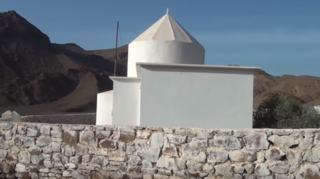Djibouti is a country in the Horn of Africa. It is bordered by Somaliland to the southeast, Eritrea and the Red Sea to the north and northeast, Ethiopia to the west and south, and the Gulf of Aden to the east.
Issa or ISSA may refer to:

Ogaden is one of the three historical names given to the modern Somali Region, the territory comprising the eastern portion of Ethiopia formerly part of the Hararghe province. The two other names are Haud and Reserved area.

Dire Dawa is a city in eastern Ethiopia near the Somali border and one of two chartered cities in Ethiopia. It is divided administratively into two woredas, the city proper and the non-urban woreda of Gurgura.

The Ogaden War, or the Ethio-Somali war, was a Somali military offensive between July 1977 and March 1978 over the Ethiopian sector of Ogaden, which began with the Somali invasion of Ethiopia. The Soviet Union disapproved of the invasion and ceased its support of Somalia, instead starting to support Ethiopia. Ethiopia was saved from a major defeat and a permanent loss of territory through a massive airlift of military supplies worth $1 billion, the arrival of between 12,000–24,000 Cuban troops sent by Fidel Castro to win a second African victory, and 1,500 Soviet advisors, led by General Vasily Petrov. On 23 January 1978, Cuban armored brigades inflicted the worst losses the Somali forces had ever taken in a single action since the start of the war. The Ethiopians and Cubans prevailed at Harar, Dire Dawa and Jijiga, and began to push the Somalis systematically out of the Ogaden. By 23 March 1978, the Ethiopians and Cubans had recaptured more than two-thirds of the Ogaden, marking the official end of the war.

The Ogaden National Liberation Front is a grass roots social and political movement, which was founded in 1984, in order to campaign for the right to self-determination for Somalis in the Somali Region of Ethiopia.

Moyale is a market town, found between the border of Ethiopia and Kenya, the administrative center for two woredas; Moyale of Somali Region and Moyale Oromia in Ethiopia.
The Dir or Abukar (Abubakr) is one of the largest and most prominent Somali clans in the Horn of Africa. They are also considered to be the oldest Somali stock to have inhabited the region. Its members inhabit Djibouti, Somaliland, Somalia, Ethiopia, and northeastern Kenya.

The Gadabuursi, also known as Samaroon, is a Somali clan, a sub-division of the Dir clan family.

Sitti Zone, formerly known as Shinile, is one of the nine zones of the Somali Region of Ethiopia.

The Issa is a northern Somali clan, a sub-division of the Dir clan family which is recognised as the oldest Somali stock.

The Djiboutian Civil War was a conflict in Djibouti, lasting from 1991 to 1994 and resulting in thousands of fatalities. This uneven power sharing between the Issas and Afars led to the Civil War that ravaged the country for three years.

The Insurgency in Ogaden was an armed conflict that took place from 1994 to 2018. It was fought by separatists, the Ogaden National Liberation Front (ONLF), against the Ethiopian government. The war began in 1994, when the ONLF attempted to recreate Greater Somalia by unifying Ethiopia's Somali Region with Somalia. It ended in a peace agreement as part of Prime Minister Abiy Ahmed's reforms.
Front de Libération de la Côte des Somalis was a nationalist organization, and later a guerrilla group, in the French Territory of the Afars and the Issas in present-day Djibouti. It competes with the Djibouti Liberation Movement (MLD), supported by Ethiopia. The FLCS was recognized as a national liberation movement by the Organization of African Unity (OAU), which participated in its financing.
The Ethiopian Somali Democratic League (ESDL) was a political party in the Somali Region of Ethiopia. It was the ruling EPRDF's regional partner from 1994 to 1998.
The military history of Djibouti encompasses the major conflicts involving the historic empires and sultanates in the territory of present-day Djibouti, through to modern times. It also covers the martial traditions and hardware employed by Djiboutian armies and their opponents.
The following lists events that happened during 2007 in Ethiopia.
The Gurgura, Gorgorah or Gurgure are a transnational clan divided between Somali and Oromo. They were historically Somali and were part of the large Dir clan. They make the majority in the Erer district in the Sitti Zone but also live in Dire Dawa, Harar region, large portions of the Oromia Region of Ethiopia and the Afar Region of that country.
The Akisho is a sub-division of the Ali Madahweyne subclan of the Dir clan family.
Gedeo–Oromo clashes are ethnic clashes in Ethiopia between the Oromo, the largest ethnic group in the country, and the Gedeo, that began in 2018, with rising political unrest in the country. The clashes led to about 800,000 mostly ethnic Gedeos fleeing their homes, a higher number and over a shorter period of time, than occurred at the height of the more publicized Rohingya crisis in Myanmar the year before. The government pressured the refugees to return to their homes even though they fear for their lives, often by denying refugees access to humanitarian aid. This conflict is concurrent with the Oromo–Somali clashes between Oromo and Somalis in the east of the country. These ethnic conflicts involving the Oromo led to Ethiopia having the largest number of people to flee their homes in the world in 2018. Some have blamed Prime Minister Abiy Ahmed for giving space to political groups formerly banned by previous Tigrayan-led governments, such as the Ginbot 7 and Oromo Liberation Front.









